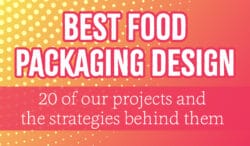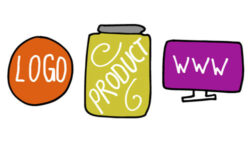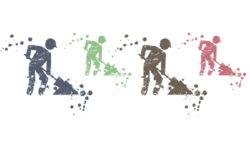The food industry has been hit hard by unforeseen circumstances the past 2.5+ years: Inflation, the pandemic, tariffs, labor shortages, supply chain shortages for both ingredients and packaging materials, cost of goods skyrocketing… All of this contributes to higher costs, and food brands are increasingly seeing how they can save money. You may be thinking, “How can I reduce the cost of food packaging design?” If so, it may be tempting to cut corners to save money on food branding and packaging when launching a new food product. But how much is it costing you in lost opportunities and unreached potential because of these cut corners?
Strategic food branding and packaging design is an investment in your brand that pays for itself many times over. When done right, it can catapult the success of your food brand from the start. A big mistake food brands make when trying to save money is by getting cheap design, which is inexperienced or unspecialized. However, this is a corner you don’t want to cut. But guess what? You can cut corners—just be sure to cut the right corners when it comes to your food packaging and design.
Below are some easy ways to save money on food branding design and food package design—without sacrificing quality and effectiveness.
Save money by avoiding this #1 mistake.
Many mistakenly see design as a commodity or as window dressing on all the hard work you’ve done in getting your product ready to take to market. This could not be further from the truth. Rather, food branding and packaging design, along with the strategic messaging on the package, is what sells your product. Why skimp on the single most important aspect of selling your product? (Besides of course, having an amazing product in the first place—that goes without saying.)
Cheap design is what often draws people to design food packaging online via inexpensive crowdsourcing design websites. There, you will most likely get a lot of ineffective design (more on this to come in a future article). However, instead of that misguided route, use your food brand design partner as the essential resource that they are to the success of your food brand.
Talk with your design partner about ways you could save money that you might not have thought of. Could the process be pared down? Is there something you could provide to the process that might make the workflow more efficient? Or, perhaps your design partner can help you find ways to print the packaging more cost-effectively (see below) to save money there which helps free up funds to invest in the proper design process. Working together with your design partner to problem-solve as a team is when the best solutions can arise.
Save money by starting with a strategy.
Where do you start with food packaging design? Always start your food branding and packaging design the right way with establishing a strategy for the brand foundation. Never cut this corner. Your food brand design partner leads this process. This foundation lays the roadmap for all the food brand design and packaging design work and serves as a guide.
Going forward, base every decision regarding branding a food product and designing food packaging in this strategy. A solid strategy will cover at least the following basics, and likely more:
- Who are you talking to?
- Why do they need your product—how will it improve or enhance their life?
- Why should they choose your product over competitors?
- Who are your competitors? What does their brand look like? What is their brand saying?
- Where will this product be sold?
- What does your brand stand for—what are its values?
- What is the brand personality and tone of voice?
Again, I can’t emphasize enough to not skip this step of laying a strategic foundation for your food brand development. A good food brand design partner will lead and guide you through this process as a team together with you.
Get creative with design for cost savings.
Here is a cost-effective food packaging design idea for a food package that is typically fully printed, such as a pouch or box. If there are several flavors in the product line, it can become cost-prohibitive to print a unique package for each flavor. Consider printing a base design that is common to all products in the line and customizing the package for each flavor with a label on that base design.
A good food design partner will integrate the label in an unusual and creative way to work seamlessly with the common base design, when they develop packaging design ideas for your food product. This way, the design integrates the label intentionally and purposefully. If the food package is not designed well, and the label integrates randomly or expectedly—it can end up looking cheap, and being obvious that you were just trying to save money.
If you only go with a label on an unprinted pouch, your food package can look generic and uninspiring. You also have less space to work with for your design and messaging, since you’re not able to use the full area of the package to your advantage. This can be fine for in-person sales such as a farmers market, where you can discuss and sample the product. For stores or online sales, however, a fully printed package makes a much greater visual impact, and leaves a more lasting impression when done right.
Customizing a food package design with an additional label adds to the manual labor, but it may be a tradeoff you’re willing to make if your focus is to save money without sacrificing quality or impact.
Plan ahead for perfect printing.
Although printing is the last step in the process, it’s actually something you want to plan for at the very beginning of the design process. At the start of the project:
- Identify the printer you’ll be working with.
- Discuss with them the packaging cost for food products.
- Ask them about the most cost-effective packaging materials you can use for your product, low-cost food packaging ideas, and any ways to make the food packaging more affordable.
- Get their dieline(s) and print specifications.
- Find out their timing for proofing and printing, and factor that into your overall project deadline—allowing extra time for the unexpected, if possible.
By locking all these things down from the start, you can be realistic about the project timeline, and your design partner can create the artwork to their dieline and print specs, versus having to rework the artwork after it is done. This saves money and wasted time by planning properly and realistically in advance.
Summing it up.
I hope you’ve enjoyed these ideas on ways to save money in food packaging design and food branding design. To sum it up: Don’t skip your strategy, simplify the design process if possible, design cost-effectively, and plan ahead for printing. Happy designing!
Are you ready for a bold, iconic food brand that achieves outstanding success? Get started here.








